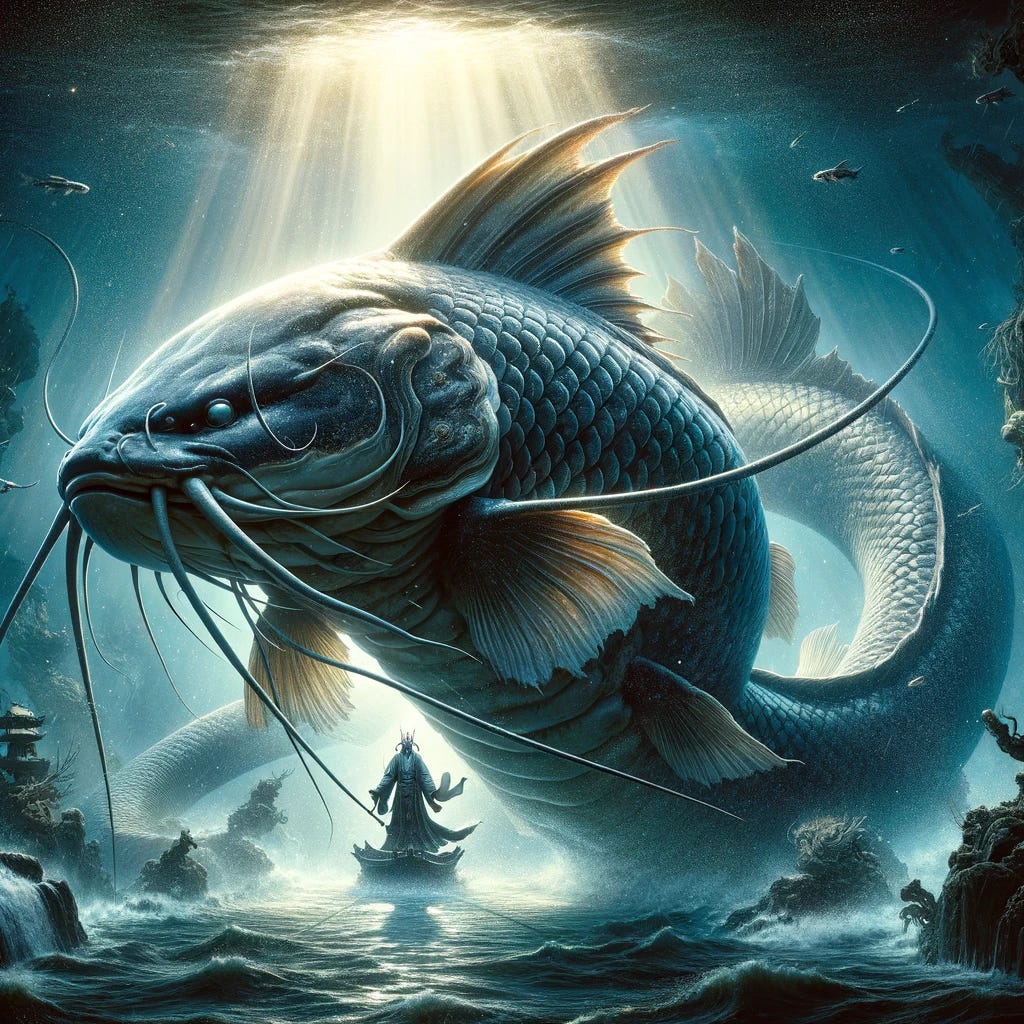Myth of the Day: Namazu
In the mystical realm of Japanese legend, a colossal catfish embodies dual forces of destruction and renewal.
Region/Culture: Japan, Asia
Mythos: Japanese Mythology (including Shinto and Yokai traditions)
Primary Type/Nature: Monsters and Beasts
Mythical Attributes: Namazu is a giant catfish that resides under the Japanese islands and is said to cause earthquakes.
Role in Mythos: Held in check by the god Kashima, Namazu is said to thrash about when Kashima lets his guard down, causing earthquakes.
Relation to Humans: Namazu is seen as both a destroyer and a creator, as his actions are believed to cause earthquakes but also lead to societal rebirth. Because of this dual nature, he is both feared and revered.
In the intricate and mystical realm of Japanese mythology, where creatures of legend roam and deities shape the destiny of the land, there resides a being of enormous power and paradoxical nature – the Namazu. This colossal catfish, dwelling beneath the very foundation of the Japanese islands, embodies a force both feared and revered by those who whisper its name.
The Namazu’s physical presence is as imposing as its mythical significance. Envision a creature of such size that it spans the breadth of rivers and the depths of oceans, its scales glinting like polished armor under the faint light that dares penetrate its underwater domain. Its whiskers, long and sinewy, undulate with the currents, sensitive to the slightest tremors of the world above. This gargantuan catfish, often depicted with a formidable demeanor, is not just any marine inhabitant; it is a force of nature, a being that intertwines with the very fabric of the earth.
The origin of Namazu in the annals of Japanese mythology is a tale as intriguing as it is foreboding. It is said that this creature, with its immense strength, lies restrained under the islands of Japan, held in check by the vigilant god Kashima. Kashima, employing a massive stone known as Kaname-ishi, exerts his divine power to keep Namazu immobile, thus maintaining the delicate balance of the earth. However, when Kashima’s attention falters, the restless Namazu thrashes, its movements so powerful that they ripple through the ground, manifesting as earthquakes that can reshape landscapes and destinies.
The relationship between Namazu and humanity is a complex tapestry woven with threads of fear, respect, and a peculiar sense of gratitude. As a harbinger of destruction, Namazu’s seismic outbursts bring devastation, toppling structures and upending lives. Yet, in a twist characteristic of many Japanese myths, this destruction is not merely an end but a beginning. The chaos wrought by Namazu’s stirrings is also seen as a catalyst for change, for societal rebirth, and transformation. In this duality, Namazu transcends the role of a mere monster; it becomes a symbol of the inexorable cycle of destruction and creation, an embodiment of the natural forces that both ravage and renew.
In the realm of special powers, Namazu’s ability to cause earthquakes is unparalleled. This capacity, while primarily destructive, also bears the seed of renewal and change. However, even a creature as mighty as Namazu has its vulnerabilities. The god Kashima’s vigilance and the Kaname-ishi stone are pivotal in keeping the creature’s immense power in check. Without these restraints, Namazu’s unchecked movements could lead to cataclysms of unimaginable scale.
In conclusion, the Namazu stands as a testament to the intricate and multifaceted nature of Japanese mythology. A creature of both destruction and creation, feared and revered, it serves as a reminder of the delicate balance that governs not just the physical world, but also the realms of belief, myth, and legend. In the whispers of the Namazu, one hears the echoes of ancient tales and the enduring power of myth to shape, explain, and give meaning to the human experience.
Suggested Further Reading
The Book of Yokai: Mysterious Creatures of Japanese Folklore by Michael Dylan Foster
Tales of Japan: Traditional Stories of Monsters and Magic by Chronicle Books
If you enjoy our content, please consider making a donation to support the people of Ukraine. Click here to visit the official Ukrainian donation website.
Explore more myths and wonders by visiting godsandmonsters.info.
Enjoy mythic tales on the move with our podcast, Five Minute Mythology.




